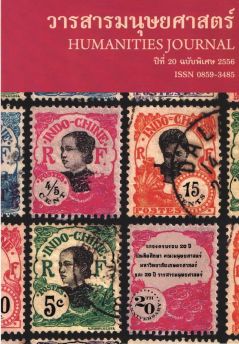แหวนดอกไม้: ตัวละครสวมบทบาทเพศตรงข้ามภายใต้ 'ความโสด' และ 'ครอบครัว' ในสังคมสมัยใหม่
Main Article Content
Abstract
บทความนี้มีจุดมุ่งหมายเพื่อแสดงให้เห็นถึงการออกนอกกรอบของตัวละครสวมบทบาทเพศตรงข้ามในนวนิยายเรื่อง แหวนดอกไม้ แสดงถึงการนิยามสถานภาพโสดของตัวเอง สร้างความเป็นปัจเจกโดยยึดสถานภาพโสด มองการแต่งงานและการสร้างครอบครัวเป็นเรื่องไร้สาระ ในขณะที่นวนิยายเป็นพื้นที่ดำรงแนวคิดแบบรักต่างเพศ การมีครอบครัวเป็นเรื่องสำคัญ ผู้ที่อยู่นอกกรอบถูกมองว่าแปลก ผิดธรรมชาติ ดังนั้นตัวละครสวมบทบาทเพศตรงข้ามที่พยายามขัดขื้นไม่เข้าไปตกอยู่ภายใต้อุดมคติเรื่องการแต่งงานและการสร้างครอบครัวตามที่สังคมกำหนดให้นั้นถูกแปลกแยกออกมา อันนำไปสู่ความรุนแรงซ่อนเร้นอยู่ในสถาบันครอบครัว ทั้งนี้ตัวละครสวมบทบาทเพศตรงข้ามได้สร้างแรงกระตุ้นให้ตั้งคำถามเปิดโปงมายาคติเกี่ยวกับกรอบความคิดเรื่องเพศสภาพที่สังคมกำหนดนั้นเป็นธรรมชาติหรือไม่ อีกทั้งความพยายามของตัวละครดูเหมือนจะรื้อถอนมายาคติเกี่ยวกับเรื่องการแต่งงานและการสร้างครอบครัวสมบูรณ์ตามที่สังคมพึงประสงค์ แต่พยายามเสนอทางออกให้ตัวละครที่อยู่นอกกรอบสามารถประนีประนอม ทำความเข้าใจ และอยู่ร่วมกันในสังคมได้
Waen Dokmai: Crossing-Gender Characters beneath ‘Singlehood’ and ‘Family’ in Contemporary Thai Society
Runchanee Srisaman
Living their lives in opposite gender roles, the characters in the
novel of “Waen Dokmai” choose their own definition of singlehood,
maintain their individuality through staying single and judge that marriage
and family life are nonsense. Due to the fact that this novel is the site of
heterosexual love preservation and of giving ‘to have a family’ value an
importance. The characters, which live their lives against these ideal
values, are judged to be alienated and unusual persons. Consequently, it
leads to acts of implicit violence in family lives. Readers, meanwhile, are
intrigued to ask whether myths of these dominant social values are usual
or not. Even though the characters seem to challenge these ideal values,
the novel does not present any social breakthrough. However, the
characters can compromise, comprehend, and live together with the
others in society.


